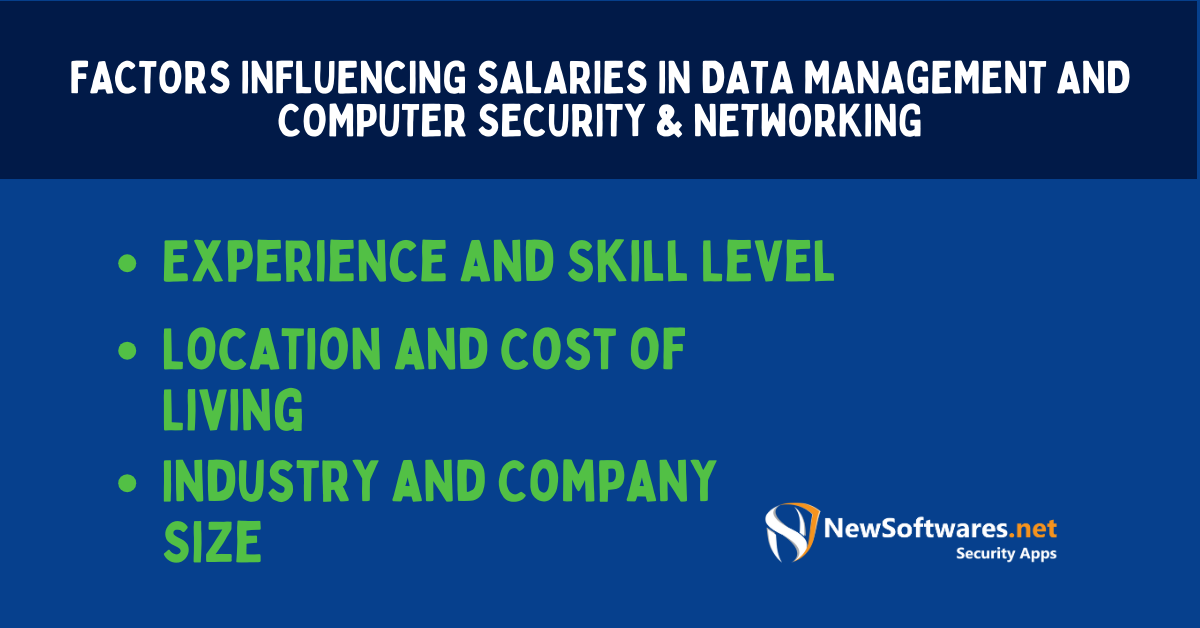Salaries vary based on region, experience, and specific roles. However, as of recent data up to 2023, computer security & networking specialists often command higher salaries due to the increasing demand for cybersecurity expertise.
The question often arises, particularly among students and early-career professionals embarking on a journey through the complex, rapidly evolving world of information technology: Which career path carries more financial potential – Data Management or Computer Security and Networking? The answer isn’t as straightforward as you might think. Various factors can influence the average salary in these fields, from experience and skill level to the cost of living in a specific location.
Understanding the Fields: Data Management and Computer Security & Networking

What is Data Management?
Data Management is a discipline connected to the organization, storage, integration, and retrieval of data in business environments. It encompasses many activities, including data governance, architecture, modeling, database administration, and data warehousing.
Professionals in this field ensure that data is accurate, consistent, secure, and easily accessible to authorized personnel. They use sophisticated tools and techniques to manage complex data systems, boosting operational efficiency and supporting strategic business decisions.
Data governance, one of the key components of data management, involves establishing policies and procedures to ensure that data is used and managed effectively. This includes defining data quality standards, establishing data ownership, and implementing data security measures. On the other hand, data architects are responsible for designing the structure and organization of databases, ensuring that data is stored logically and efficiently.
Data modeling is another important aspect of data management. It involves creating visual representations of data structures, which help understand the relationships between different data elements. This enables organizations to effectively organize and examine their data, leading to better decision-making and improved business outcomes.
Database administrators play a crucial role in data management by overseeing database system installation, configuration, and maintenance. They are accountable for ensuring the security and integrity of data, as well as optimizing database performance. Additionally, they monitor database usage, troubleshoot issues, and implement backup and recovery strategies to safeguard against data loss.
Data warehousing is a concept that involves consolidating and organizing data from different sources into a single, centralized repository. This allows organizations to analyze large volumes of data and gain valued insights to drive business development and innovation. Data management professionals are often involved in designing and managing data warehouses, ensuring that data is accurately loaded, transformed, and made available for analysis.
What is Computer Security & Networking?

Computer Security & Networking, on the other hand, revolves around protecting computer systems and networks from threats such as viruses, hackers, and data breaches. It’s a broad field that includes activities related to information security, network security, computer forensics, and cybersecurity.
Computer Security & Networking professionals are tasked with designing, implementing, and monitoring security measures that protect computer systems and data. They are crucial in defending organizations from cyber threats and mitigating potential risks.
Information security is a fundamental aspect of computer security and networking. It protects sensitive information from unauthorized access, use, disclosure, disruption, modification, or destruction. This includes implementing access controls, encryption, and authentication mechanisms to ensure only authorized individuals can access and manipulate data.
Network security focuses on safeguarding computer networks from unauthorized access and potential attacks. This includes implementing firewalls, intrusion detection systems, and virtual private networks (VPNs) to secure network infrastructure. Network security professionals monitor network traffic, identify and mitigate vulnerabilities, and respond to security incidents.
Computer forensics is a specialized field within computer security and networking that involves investigating and analyzing digital evidence in legal cases. Forensic professionals use advanced techniques and tools to recover and analyze data from computers, networks, and other digital devices. They play a crucial role in uncovering evidence of cybercrimes and providing expert testimony in court.
Cybersecurity is an ever-evolving field that focuses on defensive computer systems, networks, and data from cyber threats. It involves identifying and assessing potential risks, implementing security controls, and developing incident response plans. Cybersecurity professionals are responsible for staying updated with the latest threats and vulnerabilities and implementing proactive measures to prevent attacks.
In summary, data management and, computer security & networking are vital disciplines that play a crucial role in ensuring the integrity, availability, and confidentiality of data and computer systems. Professionals in these fields are equipped with the information and skills to navigate the complex landscape of data and security, contributing to the success and resilience of organizations in today’s digital age.
The Importance of Data Management and Computer Security & Networking in Today’s World
The Role of Data Management in Businesses
Companies progressively rely on data to drive strategic decision-making, optimize operations, boost customer service, and spur innovation. Therefore, efficient data management is crucial.
Data management professionals help organizations structure their data, ensure its accuracy, and maintain its security, enabling them to leverage the full potential of their data assets. Without effective data management, companies risk making decisions based on erroneous, inconsistent, or outdated information.
One of the key aspects of data management is data governance. Data governance involves establishing policies, processes, and procedures to ensure data quality, privacy, and security. It also contains defining roles and responsibilities for data management and implementing data standards and best practices. By implementing robust data governance practices, organizations can ensure their data is reliable, consistent, and secure.
In addition to data governance, data management encompasses data storage and retrieval. With the exponential data growth, organizations need efficient and scalable storage solutions to handle the ever-increasing volume of information. Data management professionals work on implementing storage systems that can handle large amounts of data while ensuring data availability and accessibility.
Furthermore, data management professionals are responsible for data integration and data cleansing. Data integration includes combination of data from multiple sources and making it available for analysis and decision-making. On the other hand, data cleansing involves identifying and correcting errors, inconsistencies, and duplicates in the data. These activities are essential for ensuring data accuracy and reliability and for making informed business decisions.
The Impact of Computer Security & Networking on Modern Technology
In this age of digital transformation, the importance of computer security and networking cannot be overstated. With the growing number of adversaries seeking to exploit vulnerabilities in computer systems and networks, robust security measures are more crucial than ever.
Computer Security & Networking professionals remain on the frontline in the war against these threats, implementing strategies to keep cyber-attackers at bay and ensuring that the integrity of data and systems is not compromised.
One of the key areas of computer security is network security. Network security involves implementing measures to protect computer networks from unauthorized access, misuse, and attacks. This comprises firewalls, intrusion detection systems, and encryption to secure network communications and prevent unauthorized access to sensitive information.
Another important aspect of computer security is data encryption. Data encryption includes converting data into an unreadable form for unauthorized users. This ensures that even if data is intercepted, it cannot be understood without the encryption key. Encryption defends sensitive data such as financial, personal, and intellectual property.
Furthermore, computer security professionals also play a crucial role in incident response and recovery. In the event of a security breach or cyber-attack, these professionals are responsible for detecting and containing the attack and recovering and restoring affected systems and data. Their expertise is essential in minimizing the impact of security incidents and ensuring business continuity.
In conclusion, data management, computer security & networking are paramount today. Effective data management ensures organizations can make informed decisions based on reliable and accurate data. On the other hand, robust computer security measures protect organizations from cyber threats and safeguard their data and systems. Together, these disciplines contribute to businesses’ smooth operation and success in the digital age.
Comparing Salaries: Data Management vs. Computer Security & Networking
When choosing a career path, salary is often a key factor. In today’s digital age, two fields that have gained significant attention are Data Management and Computer Security & Networking. Both fields offer promising career prospects and competitive salaries, but how do they compare?
Average Salaries in Data Management
Data Management professionals play a crucial role in organizations by ensuring that data is collected, organized, and stored effectively. According to the U.S. Bureau of Labor Statistics, the median annual wage for Data Management professionals is $93,350. This impressive figure reflects the high demand for individuals with expertise in managing and analyzing data.
However, it is important to note that this median salary is just the starting point. As professionals gain specialized skills and extensive experience in the field, their compensation can scale even higher. For example, data scientists, who are highly sought after for their ability to extract valuable insights from complex datasets, often command six-figure salaries.
Moreover, the salary range in Data Management is broad, offering room for growth and advancement. Those who specialize in areas such as data architecture, data governance, or data analytics can expect to earn even higher salaries. These specialized roles require a deep understanding of data systems, algorithms, and statistical analysis, making them highly valued in today’s data-driven world.
Average Salaries in Computer Security & Networking
Computer Security & Networking is another field that has experienced rapid growth in recent years. With the increasing threat of cyberattacks and the need to safeguard sensitive information, organizations are willing to invest heavily in professionals who can protect their networks and systems.
According to the U.S. Bureau of Labor Statistics, the median annual wage for professionals in Computer Security & Networking is slightly higher than that of Data Management, at $98,350. This higher salary reflects the critical nature of the work performed by these professionals and the level of expertise required to ensure the security of digital assets.
Similar to Data Management, the salary in Computer Security & Networking can increase significantly for experts in the field or those in high-demand specialties. Cybersecurity specialists, for instance, who possess advanced knowledge of encryption, intrusion detection, and vulnerability assessment, can earn top salaries in the industry.
Furthermore, as technology evolves, so do the challenges in securing computer networks. This constant evolution creates a demand for professionals who can stay ahead of emerging threats and implement robust security measures. As a result, individuals who specialize in areas such as cloud security, network architecture, or ethical hacking can expect to earn substantial salaries.
In conclusion, Data Management, Computer Security & Networking offer lucrative career opportunities with competitive salaries. While Data Management professionals earn a median annual wage of $93,350, those in Computer Security & Networking enjoy a slightly higher median salary of $98,350. However, it is important to remember that these figures are just starting points, and with specialized skills and extensive experience, professionals in both fields can command even higher salaries.
Factors Influencing Salaries in Data Management and Computer Security & Networking

Experience and Skill Level
As in most professions, the level of experience and skill influences earning potential in both fields. Professionals with well-rounded expertise and a proven track record can command higher salaries.
Location and Cost of Living
The location also impacts earnings, as the price of living can differ widely across different regions. High-tech hubs such as California’s Silicon Valley or New York often offer higher salaries to compensate for the higher cost of living.
Industry and Company Size
The industry sector and the company’s size can also affect compensation levels. Larger companies and industries such as finance or healthcare, which deal with highly sensitive data, tend to offer higher salaries.
Career Growth Opportunities in Data Management, Computer Security & Networking
Career Paths in Data Management
There are frequent opportunities for career growth in data management. You might start as a data analyst or database administrator and work up to a data architect or manager role. Certified professionals and those with a strong understanding of business intelligence platforms have the potential to climb even higher on the ladder.
Career Paths in Computer Security & Networking
The same applies to those pursuing a career in Computer Security & Networking. Entry-level roles may include network administrator or information security analyst, with potential progression to senior roles like a security manager or chief information security officer. More than ever, companies worldwide are looking for talented professionals in this field to help them navigate evolving cyber threats.
Key Takeaways
- Cybersecurity roles are in high demand due to rising cyber threats.
- Data management roles are also crucial, especially in big data and analytics-driven organizations.
- Experience, certifications, and specialization can significantly impact salaries.
- Both fields offer promising career growth and opportunities.
- Continuous learning and staying updated with industry trends is vital in both domains.
FAQs
Q: Why is there a high demand for computer security specialists?
A: With the rise in cyber threats and the critical nature of digital data, businesses prioritize securing their digital assets.
Q: Can data management professionals transition to computer security roles?
A: With relevant training and certifications, they can transition and vice-versa.
Q: Which certifications are beneficial for computer security roles?
A: Certifications like CISSP, CISM, and CompTIA Security+ are valuable.
Q: Are remote job opportunities prevalent in both fields?
A: Data management and computer security roles offer remote work opportunities, especially post-pandemic.
Q: Do both roles require continuous learning?
A: the tech field is always evolving, necessitating professionals to stay updated.
Conclusion
So, which pays more — Data Management or Computer Security & Networking? The answer varies based on your specific situation and the factors mentioned above. Both fields offer competitive salaries, and the choice often comes down to personal interests and long-term career goals. Whichever route you choose, you’ll likely find a rewarding, high-paying career in the booming IT industry.
